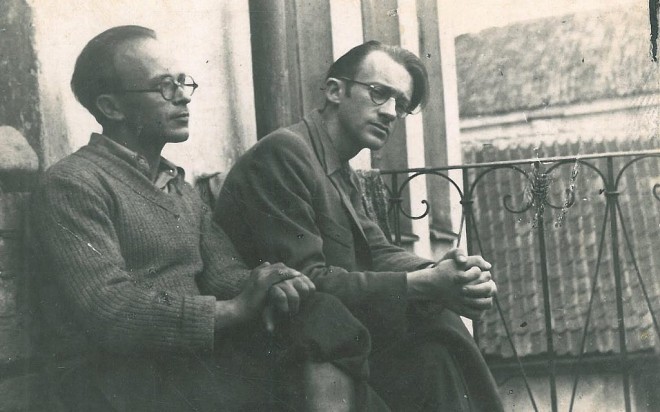
“If you carry your childhood with you, you never become older.”
Abraham Sutzkever
The Blade of Grass From Ponar
by Abraham Sutzkever
Translated by Maia Evrona
I kept a letter from my hometown in Lithuania, from one
who still holds a dominion somewhere with her youthful charm.
In it she placed her sorrow and her affection:
A blade of grass from Ponar.
This blade of grass with a flickering puff of dying cloud
ignited, letter by letter, the faces of the letters.
And over letter-faces in murmuring smolder:
The blade of grass from Ponar.
This blade of grass is now my world, my miniature home,
where children play the fiddle in a line on fire.
They play the fiddle and legendary is their conductor:
The blade of grass from Ponar.
I will not separate from my hometown’s blade of grass.
My good, longed-for earth will make room for both.
And then I will bring a gift to the Lord:
The blade of grass from Ponar.
In this period where many of us are home, isolated and a little stir crazy, more than the usual level of crazy, poetry can be a much needed tonic. I object a bit though, when I see heroic words attached to articles and blog posts about how poetry is a “life saver.” I also object to the constant shaping of our pandemic response in militaristic terms. This is not a healthy mindset or discourse for our society in my opinion. Framing everything as it were a battle, is war mongering of a different sort, that could lead to unhealthy bias and discrimination around cause and effect, resulting in finger pointing at the “other” as the cause, rather than searching for deeper understanding that blame is not a cure for COVID-19. The constant use of military terms for this public health crisis is unnecessarily violent hyperbole that serves no real value. These aren’t battles being fought, despite how distressing and grim they are for families impacted by this pandemic, health care workers working to exhaustion, laid off workers and bankrupt business owners. This is a disease. Battles are fought with guns and bombs. Disease is fought with shared purpose, sound public health strategies, good will, intelligent medical intervention and patience. No one is shooting at each other with intent to kill despite the rhetoric by news commentators.
However, there are poets who can say, “poetry saved my life.” When Yiddish poet Abraham Sutzkever said that poetry was his salvation, he meant it, literally. In 1944, Sutzkever and his wife, Freydke, needed to walk through a minefield to reach a plane that would take them to freedom. And to do so, they stepped to the rhythm of poetic meter — short, short, long, then long, short, long. Was it luck or poetry that saw them through that immediate and present danger safely? Regardless, it was his writing which had secured their opportunity for freedom. Sutzkevers writing about the Holocaust in Vilnius caught the attention of Russian leaders and with it his role in protecting and hiding historical Jewish texts from the Nazis. This prompted the Soviets to send not one but two rescue missions into Nazi-occupied Lithuania to fly the Sutzkevers to Moscow. Two years later Sutzkever testified on behalf of the Soviet Union at the Nuremberg trails in Germany. Sutzkever’s poetry stands as a testament of how poetry can triumph over tyranny and ultimately the ability of words to deliver justice, equally or more powerfully than bullets from guns.
From Epitaphs
by Abraham Sutzkever
Translated by Jacqueline Osherow
Written on a slat of a railway car:
If some time someone should find pearls
threaded on a blood-red string of silk
which, near the throat, runs all the thinner
like life’s own path until it’s gone
somewhere in a fog and can’t be seen—
If someone should find these pearls
let him know how—cool, aloof—they lit up
the eighteen-year-old, impatient heart
of the Paris dancing girl, Marie.
Now, dragged through unknown Poland—
I’m throwing my pearls through the grate.
If they’re found by a young man—
let these pearls adorn his girlfriend.
If they’re found by a girl—
let her wear them; they belong to her.
And if they’re found by an old man—
let him, for these pearls, recite a prayer.

Beautiful
LikeLike
I had the same word – I read this poem aloud to myself and then said, ‘It’s really beautiful. Really beautiful’. Out loud. To myself.
LikeLike